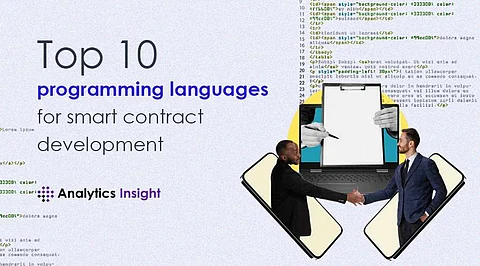

Smart contracts have emerged as a groundbreaking innovation within the realm of blockchain technology, revolutionizing the way agreements are executed in a decentralized and automated manner. These self-executing contracts have gained immense popularity due to their transparency, security, and efficiency in a wide range of applications, from finance and supply chain management to digital identity and decentralized applications (DApps).
In this dynamic landscape, certain programming languages have risen to prominence for their effectiveness in creating smart contracts. In this article, we'll explore the top 10 programming languages that have become the go-to choices for developers looking to build secure and efficient smart contracts.
C++ is one of the oldest development languages on the listing. It became delivered by Bjarne Stroustrup in 1983 to add object-orientated features to the interval. it's also a compiled language, which makes it carry out properly, however, the compilation procedure adds an additional step to the improvement process. Thus, C++ is supported with the aid of famous blockchain projects, such as EOS, Stellar, and Ripple.
Readability is a more recent smart contract programming language brought for the Stacks blockchain. It employs a framework for writing decentralized programs that integrate digital belongings, data, and identification in new methods. However, one novel feature is that readability is a non-Turing-entire programming language, which means it cannot simulate each characteristic of a Turing device. Hence, clarity apps are also interpreted as opposed to compiled, which could make it less difficult to locate and fix insects after deploying an app.
James Gosling advanced the Java programming language within the early nineteen nineties as a replacement for C++. One of its maximum essential capabilities is the capacity to write down once and run anywhere. Besides, a key innovation became a just-in-time compiler that allows Java programs to run on special methods and working systems. Java may be used to write smart contracts on Corda, Ethereum, Hyperledger fabric, IBM Blockchain, and Neo. It has a big development network and huge surroundings of open supply additives.
JavaScript is one of the maximum popular programming languages for developing internet applications at the front end. it is taken into consideration smooth to learn and has an in-depth open supply network, which helps developers get commenced fast. JavaScript is a completely exceptional language brought via Netscape in the mid-1990s. A number of the most popular blockchain structures guide it, together with Ethereum, Hyperledger fabric, Neo, and Solana. It's a terrific preference for developing the front ends for decentralized apps.
Guido van Rossum created the Python programming language in the early 1990s. It helps a variety of utility improvement principles, which include item-orientated programming and based programming Python is one of the most popular languages for growing AI apps. One of its pinnacle benefits for smart agreement developers is ease of use. However, it's far an interpreted language, that may slow overall performance as compared to other languages.
Rust has grown into one of the most popular development languages for writing returned-stop applications. it is also a great preference for writing pretty scalable and speedy-acting smart contract programs. However, it could be greater complicated to increase the pinnacle of Rust in comparison to languages like JavaScript, Python, or smart contract-particular languages.
Solidity is fingers down the most popular smart contract programming language. It was brought by way of Ethereum founder Gavin Wood in 2014 and later stronger by a crew on the Ethereum assignment. It runs on a number of the maximum popular blockchain systems, consisting of Avalanche, Binance, Counterparty, Ethereum, Tron, and Polygon. It is based on JavaScript syntax, which may make it less complicated to analyze. Some other key advantage is its huge community of clever contract developers that can assist builders grasp the fundamentals of writing dApps.
Vyper is a newer intelligent agreement programming language that is comparable to Python. It lets developers design smart contract programs that operate on top of Ethereum, providing extensive support for dApps. Vyper is a contract-oriented, pythonic programming language that targets the Ethereum Virtual Machine (EVM). It was created to improve Solidity, another Ethereum smart contract language, by reducing dangerous practices and improving readability; Vyper tries to enhance the security and audibility of smart contracts.
Yul is another smart settlement programming language that is supposed to improve performance and lower transaction costs compared to Solidity. Yul+ is a variant with features intended to make smart settlement development extra efficient; it additionally introduces new operators for describing complicated smart settlement ideas more effectively. One purported advantage is higher great-grained manipulation over how utility tactics force charges for executing smart contracts. Yul apps also can supplement Solidity to enhance utility development pace and flexibility.
Open-sourced Golang is a computer language that is based somewhat on the syntax of C. Golang is a simple programming language that is straightforward to learn, and there are already more than 800,000 Golang developers worldwide.
Google invented the programming language in question. It is a single language that enables concurrent programming by enabling the operation of multiple processes simultaneously. Golang is the primary programming language used by HyperLedger to create its chain code for smart contracts. Golang is another smart contract programming language supported by FLETA.
All of the smart contract programming languages in the above discussion showcase promising potential in different areas. Hence, when choosing a programming language, factors such as platform compatibility, developer experience, security considerations, performance, and ecosystem support should be evaluated.
Join our WhatsApp Channel to get the latest news, exclusives and videos on WhatsApp
_____________
Disclaimer: Analytics Insight does not provide financial advice or guidance on cryptocurrencies and stocks. Also note that the cryptocurrencies mentioned/listed on the website could potentially be scams, i.e. designed to induce you to invest financial resources that may be lost forever and not be recoverable once investments are made. This article is provided for informational purposes and does not constitute investment advice. You are responsible for conducting your own research (DYOR) before making any investments. Read more about the financial risks involved here.
